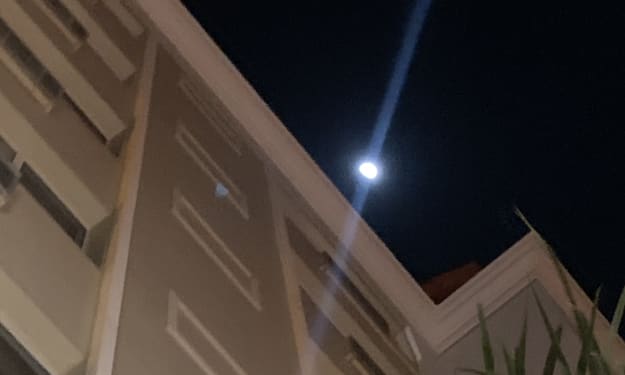Soul Sisters
I have become Edna

My soul sister and I first met in 1988, and we’ve taken such journeys together.
In my third year of university, I enrolled in American Literature 1850-1920. As a literature class of that caliber should, it covered authors such as Twain, Hawthorne, Melville, Faulkner, and Alger. One author I was unfamiliar with was Kate Chopin. We were assigned to read The Awakening.
I must admit I didn’t fully appreciate the plot; I was 23 years old, single, childless, and naïve. Sprinkled with French phrases and references to 19th century routines and manners, it felt like just another author blathering on about drama in her life. Melville had his whale, Alger his poor boys, and Hawthorne his trollop. Just more words.
In one class, however, we learned that Chopin’s work not taken seriously after The Awakening was published in 1899. This caught my attention…why? Professor Collins explained how Chopin's characters acted against societal norms and did not act according to their station in life.
I felt extremely uncomfortable. What societal norms? Edna (the main character) did what she wanted without anyone’s permission. Why was this considered bad? The feminist inside of me was awakened. The essay I wrote for that book was entitled “That Feminist Thing: Chopin’s The Awakening: (“Get it, Girl!”). In my paper, I wrote: “The simple [case] of being born female…is a final determiner in social position. …. To be a woman was to fulfill an ambivalent and compromising role.”
In college, I didn’t fully grasp the nature of Edna’s actions and needs as a wife and mother. She behaved rather random and petulant. It was an alien state of being to me until I got married. I was now united in spiritual flesh with another, no longer able to make decisions based solely on what I want. Compromise had entered the picture. Edna was beginning to impart some truths to me.
In one chapter, Edna wants to sit outside on her own porch, alone. She tells her husband Leonce, “I mean to stay out here. I don’t wish to go in, and I don’t intend to.” He comes outside to smoke a cigar and stays there. As hours go by, Edna finally decides she’s cold on that uncomfortable swing and wants to go to sleep. She goes back inside, and only then does Leonce put out his cigar and retire. That kind of passive-aggressiveness opened my eyes.
I read The Awakening every summer. Each time, I pick up more hints Chopin provides about how women can transform. Old Mademoiselle Reisz, the musician in the story, is alone. She is powerful and influences Edna to be more than she is. One summer my husband and I drove across Louisiana, and I pictured Grand Isle where the story is set - wild, desolate, endless. I could see in my mind the bathhouse by the water where Edna would watch the swimmers in the gulf.
Then I had children, two boys like Edna’s Raul and Etienne. During another summer reading I felt the weariness of being defined as nothing more than a mother and wife. I had lost my “self” somewhere along the way as Edna did. Edna decides in one chapter to rent a room in town so she could immerse herself in painting, ignoring the fact she’s still a wife and mother. Those were no longer at the top of her priority list. I fully understand her need to be more than an object, a possession, a prop. A woman’s mind was not worthy of notice. I myself was a teacher, a mother, and a wife, but not much else. I had nothing to define myself as Edna did.
When her final dream of freeing herself seems to disappear, she becomes despondent. Today that diagnosis might include long-term post-natal depression or bipolar disassociation. For Edna, her final shot at true emancipation deemed her irresponsible and immoral by literary critics. I think she finally found her freedom.
For thirty-three summers now, I’ve read Chopin’s words and feel that same longing for connection and love. That led me to wonder how she got herself into that position in the first place. My mind swirled toward the words at the end of The Awakening and a prequel began to form…
“Good-by, because I love you.”
Edna looked into the distance, and the old terror flamed up for an instant, then sank again. She heard her father’s voice and her sister Margaret’s. She heard the barking of an old dog that was chained to the sycamore tree. The spurs of the cavalry officer clanged as he walked across the porch. There was the hum of bees, and the musky odor of pinks filled the air.”
The old watchdog outside began to bark, announcing that a stranger was approaching the homestead. A handsome young cavalry officer knocked on the door of the old clapboard house. Officer Gouvernail waited patiently as the front door opened. The Mississippi air carried notes of magnolia into the house, quite unlike the Kentucky fields of strong wheat Edna Blanton remembered as a young child as she opened the door and shyly examined the officer, replete in his smart Confederate uniform.
“Good morning, young Miss. Is your mother home?” He held in his hand a letter of some great import as he pulled it from his worn satchel. Gouvernail shifted his weight, strangely uncomfortable in his state at the moment.
Edna looked up at the officer’s face, clean shaven, deep brown eyes that held mystery that made Edna blush. Only fifteen years of age, her heart fluttered to hear his deep even voice of command. The headiness of springtime, and the odor of pinks and the hum of bees near the wisteria hinted of change of season. “Yes, Sir. Just a second, Sir.”
She turned excitedly and her white dress flounced around her legs as a cat dashed around her feet. Entering the white kitchen where her mother was preparing a light evening luncheon, Edna broke the silence. “Mama,” she said breathlessly, “there’s an officer in uniform at the front door.” Edna was sad the officer wasn’t asking for her hand in marriage; she was completely enamored by the important officer on their doorstep.
Anna Blanton wiped her hands, took off her starched white apron, and addressed her middle daughter. “Edna, please see to it the chickens have been watered and fed properly. Janet forgets to do these things.” Anna walked through the house, hesitating, worried about what business this young gentleman might be conducting. Through the back porch door Edna exited, unwilling to miss this conversation. She opened the door of the coop and counted the chickens to make sure none were taken by coyotes during the night. She moved to the far end of the coop to pump water from the well where she could easily see the front porch where the two people stood.
Mrs. Blanton greeted the officer who then handed her the letter. Edna watched as her composed mother read it, her hand covering her mouth as she fainted into the arms of the officer. This action took Edna completely by surprise. Gouvernail helped Mrs. Blanton to the porch swing, and kneeled beside her, gently holding her hand and patting it. How extraordinarily bold, Edna thought, for such intimacy between strangers.
Edna at first did not comprehend the contents of letter; whatever it was, she was certain did not bode well for her, her oldest sister Margaret, and younger sister Janet. She looked at the porch, still and peaceful in the springtime, a little weathered since her father had gone to fight in the War two years ago. Only her mother broke the silence with her crying as the officer attempted to comfort her.
Wearing an uneasy expression, the young officer in his gray uniform and leather boots left the porch, his spurs clanging on the pine boards, and walked toward his waiting horse under the magnolia tree. He mounted the black mare, pulled the reigns and rode down the road, dust rising up from the galloping animal as cicadas sang in the trees. Edna watched him go, wondering what other news he shared.
Mrs. Blanton entered the house and closed the door behind her, bringing sadness and a sudden decay in joy. She called her daughters to the parlor. Edna came in from the coop, Janet was braiding her hair, and Margaret had been mending clothing near the light of a window. All three sat in the chairs of the parlor, time stopping for a moment as they noticed their mother’s red eyes and the letter, damp with tears, in her hand.
Seated on the sofa, Mrs. Blanton looked at the folded letter and then at the girls. The girls grew uneasy as they had never seen their mother at a loss for words. “Your father was on guard duty, and…” her tears began to fall again. “…And he was fired upon as he walked back to camp. Your father is not coming home this time.” She dropped the letter on the floor, leaned back into the sofa, stared at the ceiling, beyond the ceiling as tears fell down her face.
Edna was stunned that the handsome officer had brought such awful news; was that his job to inform widows of their husbands’ demise? Margaret had gotten up to fetch some water for Mother and a damp cloth to cool her brow. Edna did not know how to feel; she remembered her father’s voice singing songs that brought her peace and calmed her when she was distraught. Songs that filled her life with a sense of meaning and happiness that would be gone forever. She realized that this was just the beginning of a new direction her life would take.
Margaret came back with the blue tea towel soaked in water and applied it to Mother’s forehead. As Margaret carefully dabbed her mother, Margaret’s face become one of concern. Sensing something was amiss, Edna asked her sister, “What is wrong?” Mother was perfectly still, still staring beyond the ceiling. Margaret shook her head and started to cry, “I am trying. Mother, please wake up. Please do not leave us alone. Who will help us?” Edna watched the scene unfold as the dawning of understanding crept in.
“I will go fetch the neighbor,” Edna decided, and left Janet to help Margaret attend to their mother. Edna walked in the direction that the officer took and walked up the path to Josiah Greene’s home. She knocked on the door.
Josiah had been their neighbor for nigh on twenty years and helped the Blantons on occasion when the crops needed gathering. The Greenes and the Blantons were the only landowners in the area who refused to force others to work the farm enslaved as property. Josiah answered the door, and he beckoned Edna to come in and clasped her hand warmly.
As a widower, Mr. Greene enjoyed a pipe of tobacco each evening, and the smell lingered throughout the house. Edna came in, sat on the couch, and began from the beginning. Josiah listened with concern, and nodded as Edna explained the officer, the letter, her mother’s reaction and demise. Josiah said, “May I come over to assist?”
“Yes, please do. Margaret is beside herself, and Janet is overcome with emotion. We will probably lose the plantation.”
“No, you won’t. I shall not hear of it,” Josiah added. They started to walk out onto the porch, the fresh air invigorating. “I will tell the constable that before your mother passed, God rest her soul, she asked me to look out for you.” Edna felt a glimmer of hope for the first time since the news of the tragedy. “Let us go see Margaret.”
They walked back up to the Blanton’s porch into the house. Margaret was now sitting across the room with Janet. Josiah took his hat off and approached Mrs. Blanton. He checked for breathing and then gently closed her eyes. He knew Death had come swiftly and mercifully. “I will call on the doctor and Pastor Quinton to make final arrangements. There will be many people here in the hour; see to it that there are refreshments if you are able.” He looked kindly at the girls, now orphans. “I will make sure you are well taken care of. John would want it this way.”
Edna thought about Margaret. As the oldest, Margaret would surely be the one to take care of them. She was mature and had learned much from her mother. She was the most level-headed of the daughters, and she wondered now about marrying and dowry, which now was in marked peril as they did not have a living relative to assure the girls would be taken care of in a fashion she never dreamed would happen.
~
More than a year had passed, and Margaret made her sisters comfortable as possible, cooking suitable meals and cleaning the domicile while Edna and Janet made sure the animals were attended to and the grounds were flowering with fruit trees and dark green hedgerows. They did not have many visitors the first year as they were still grieving and managed such a great amount of property. With Josiah’s guidance, Margaret had been bold to send notice to a few acquaintances about their predicament and received some ardent replies.
Monsieur Leonce Pontellier was a wealthy merchant from New Orleans who had responded to Margaret’s request. Mr. Greene had checked into his credentials to establish that he was a man worthy of marrying a Blanton. A young man aged twenty-five years, he had made the three-day journey to Jackson to see Margaret and meet Edna for the first time. Margaret had mentioned Edna’s poise and charm, her skills in homemaking and other artistic and musical endeavors, and her desire to marry. Margaret did not inform Edna of this meeting for fear Edna would relish her free spirit and reject any suitor.
Mr. Pontellier approached the house from his coach, and disembarked. He briefly surveyed the Blanton home, and walked stoically onto the porch. Quelle maison terriblement simple. Quel dommage, he thought to himself.
He viewed this as a simple transaction of sorts. Mr. Pontellier knocked on the front door, and Edna answered. She fancied that the handsome young officer had returned. She was slightly disappointed to see a stranger at the door.
“Good morning. My name is Monsieur Pontellier, and I am here to meet with Ms. Margaret Blanton.” Cordially he tipped his hat and waited patiently to receive Edna’s reply.
“One moment, please” she replied dispassionately. She turned on her heel and retreated within. Mr. Pontellier mused, Elle n'est pas entièrement belle, mais elle n'est pas non plus simple. He wondered if Edna would fit into the ‘Cadian and Creole society of New Orleans with their complicated social customs. The sisters invited him in and offered a delightful repast after his long trip from New Orleans.
“Thank you, Ms. Blanton. My condolences on the loss of your mother and father.” Edna, startled by his familiarity with their family, was confused. “As per our earlier correspondence, I understand a sum of $1,000 would make a substantial dowry that will allow you to keep the plantation maintained for years to come.” He turned toward Edna, and asked, “Good mademoiselle, would you do me the honor of becoming my bride? Father Francois would be available to make final arrangements, and my servants would see to your wishes prior to the wedding day.”
He paused to interpret the expression on her face. “I take it you were not informed of this arrangement by your otherwise caring sister?” He looked at Margaret with a hint of disdain. He turned back toward Edna. “You must think I am coarse to have not asked you prior to this. I had assumed, wrongfully, you were amicable to this idea. I see now this is not the case.” He tipped his hat again. “Again, I apologize for this intrusion and my misplaced ardor,” and he stood up with final intention.
“No, please wait.” Edna’s voice was strong, confident, a voice she did not even know she possessed. “Mr. Pontellier, although I was not made aware of this arrangement,” Edna glared at Margaret, “I would like very much to entertain this offer if you will still have me.” Edna smiled, coyly considering that she would finally be free from Margaret’s oppressive control; Margaret had taken care of all the smallest details of Edna’ life. She longed for heady independence and the realm of an empress. “I shall be ready tomorrow to travel to New Orleans, though I have never been.”
Mr. Pontellier was duly impressed with Edna’s dignified yet impulsive acceptance. “Our family spends time between New Orleans and Grand Isle, and I believe it would be a splendid place to raise a family.” Edna was shocked and had not considered the concept of family, especially with a Catholic man. Edna’s father was unabashedly Protestant and would have vehemently disapproved of this marriage. This was more impetus for Edna to consider this marriage; it was an affront to Margaret as well; Margaret’s face fell upon hearing about Father Francois. Edna would indeed miss her impetuous and like-minded Janet, but she would finally feel free, heart and soul, free.
Mr. Pontellier, standing up once more, addressed Edna, “J'attends avec impatience mon avenir avec toi,”explaining, “I look forward to my future with you.” Expressionless, he tipped his hat toward the women as he left. Edna watched his stylish carriage through the window and wondered what her future would be like with him. Envisioning a life of romance and bliss, she looked into the distance and dreamt of long, delicious days by the Gulf and becoming the wife of a loving husband, beloved and appreciated by all and fulfilled by all the diversions life had to offer.
About the Creator
Barb Dukeman
After 32 years of teaching high school English, I've started writing again and loving every minute of it. I enjoy bringing ideas to life and the concept of leaving behind a legacy.






Comments (2)
"I enjoyed reading your prequel to The Awakening. You captured the tone and style of Chopin's writing beautifully, and your characters were well-developed."
Excellent work